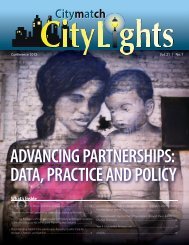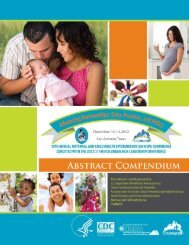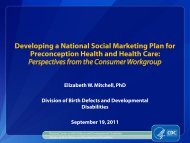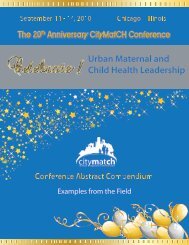Conference Abstract Compendium Examples from the ... - CityMatCH
Conference Abstract Compendium Examples from the ... - CityMatCH
Conference Abstract Compendium Examples from the ... - CityMatCH
You also want an ePaper? Increase the reach of your titles
YUMPU automatically turns print PDFs into web optimized ePapers that Google loves.
2009 <strong>CityMatCH</strong> Urban MCH Leadership <strong>Conference</strong>The role of faith in family planning for sou<strong>the</strong>rn African-American womenPRIMARY CONTACT:Laura Gaydos, PhDResearch Assistant ProfesorEmory UniversityRollins School of Public Health1518 Clifton Rd. NE, STE 626Atlanta, GA, 30322Phone: (404) 727-6554Fax: (404) 727-9198Email: lgaydos@emory.eduWebsite: www.rhcemory.orgCATEGORYFaith and healthFOCUSData FocusCO-PRESENTER(S)/AUTHOR(S):Carol Hogue, chogue@emory.edu (Author)Thompson Winifred, wthomp3@sph.emory.edu(Author)Audrey Flak, audreyflak@gmail.com (Author)BACKGROUNDAfrican-American women in <strong>the</strong> Sou<strong>the</strong>ast United States face inexplicably higher rates of unwantedpregnancies and negative birth outcomes. Although statistical data indicate that religion does not correlatewith whe<strong>the</strong>r or not adult women use contraception, our preliminary qualitative research indicates thatreligious/spiritual/cultural findings may mediate some activities which underlie choices women make –consciously and subconsciously- about <strong>the</strong>ir sexuality, partners, and family formation.OBJECTIVESWe conducted a survey of low-income, African-American women regarding how faith affects <strong>the</strong>irreproductive health decision making. We hypo<strong>the</strong>sized that <strong>the</strong>y would• Demonstrate a high level of religiosity and spirituality.• Demonstrate a positive correlation between religiosity, spirituality and use of highly effectivecontraceptive methods.METHODSWe collected data for three weeks <strong>from</strong> women attending Women, Infant and Children (WIC) programsclinics at two urban, metro-Atlanta health clinics. The survey included questions on contraceptive usage,family planning, religious attendance, religiosity/spirituality scales, and demographics. 441 women, ages19-49, participated in <strong>the</strong> study, including 378 women who self-reported as African-American or BlackCaribbean (79.89% Christian affiliation, 5.29% Muslim affiliation, and 7.14% o<strong>the</strong>r or no affiliation).RESULTSLow-income, African-American women showed a very high level of spirituality (mean value = 59.5 outof 14-75 scale) and moderate religiosity (mean = 11.8 out of 4-24 scale), which appeared to be tied to<strong>the</strong>ir beliefs about contraceptives. A one-point increase on <strong>the</strong> religion scale indicated an 8.7% decreased87







